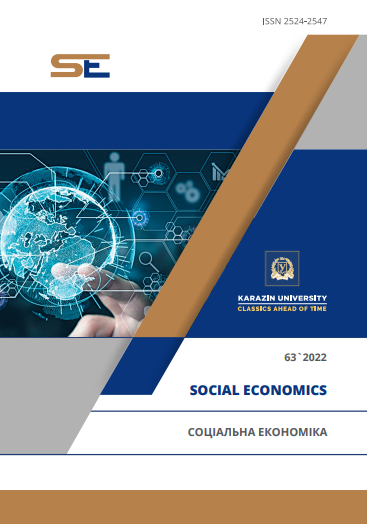MANAGEMENT OF ELECTRONIC KNOWLEDGE OF PERSONNEL USING COMPUTER AND INFORMATION SYSTEMS
Abstract
Abstract. The article substantiates socio-economic approaches and the relevance of implementing a knowledge management system at the enterprise. The knowledge of HR managers can be divided into: fundamental, ensuring specialization and success; technological and informational regarding the introduction of innovations. E-knowledge management is an interrelated part of Personnel Management in an enterprise, which shows the ability to produce added value from intangible assets. The main resource areas of the e-knowledge management program are people, processes, technology, structure, and value orientations.
Knowledge management is a subsystem for implementing electronic knowledge management, searching for it, maintaining it, reproducing it, applying automation and storing information about knowledge. Undoubtedly, this is what strengthens the leadership position in the real market segment. The use of e-knowledge management software improves: new employee adaptation, information segmentation by projects, setting benchmarks, enabling dynamic search, developing a content creation platform, improving customer service, and consolidating knowledge over time. The components of the process of creating, identifying, and using electronic knowledge to maintain and achieve a positive result are presented. The main obstacles are the low professionalism of employees and their skills in applying information technology programs to introduce innovations in the field of knowledge management. Calculating the cost of purchasing and implementing “PCRecruiter” software shows the high cost and long-term payback of this project for a medium-sized enterprise with 200 employees. In times of crisis and war, the use of "PCRecruiter" is possible for large enterprises with a high level of income. It is advisable to choose cheaper software packages Galaxy ERP, SAPR/3, OracleAplications.
Downloads
References
Jennex, M. E., & Olfman, L. (2006). A Model of Knowledge Management Success. International Journal of Knowledge Management (IJKM), 2(3), 51-68. doi: http://doi.org/10.4018/jkm.2006070104.
Svatiuk, O. R. (2007). Systema upravlinnia znanniamy yak element menedzhmentu kadrovoi polityky v orhanizatsii. Naukovyi visnyk, 17.8, 241–243. Retrieved from https://cyberleninka.ru/article/n/sistema-upravlinnya-znannyami-yak-element-mened-zhmentu-kadrovoyi-politiki-v-organizatsiyi. (in Ukrainian)
Vazhlyvist rozvytku liudskoho kapitalu u suchasnomu sviti. (2021) Yakoiu maie buty stratehiia Ukrainy 18.06.2021 vid UIFuture Retrieved from https://uifuture.org/publications/vazhlyvist-rozvytku-lyudskogo-kapitalu-u-suchasnomu-sviti-yakoyu-maye-buty-strategiya-ukrayiny/. (in Ukrainian)
Ukrainska shkola uriaduvannia (UShU). (2022). Retrieved from https://osvita.diia.gov.ua/courses/barrier-free-government. (in Ukrainian)
Kuznietsova, A. Ia. (Eds.). (2021). Social security in Ukraine: a textbook. Lviv : Universytet bankivskoi spravy. Retrieved from http://repository.ubs.edu.ua/xmlui/handle/123456789/2729. (in Ukrainian)
Sytnyk, N. I. (2021). Kreatyvnyi menedzhment: praktykum: navch. posib. dlia stud. spetsialnosti 073 «Menedzhment» osvitno-profesiinoi prohramy «Menedzhment i biznes administruvannia» KPI im. Ihoria Sikorskoho. Kyiv : KPI im. Ihoria Sikorskoho. (in Ukrainian)
Martínez, M. (2010). Micro-Bargaining as Enhancer of Knowledge Management. A Comparison between Mexico and Germany, Books, Rainer Hampp Verlag, edition 1, number 9783866184756.
Kozak, Yu. H. (2014). Mizhnarodna ekonomika: v pytanniakh ta vidpovidiakh. pidruch. K.: Tsentr uchbovoi literatury.
Babu, S. (2021). Administrative and socio-economic systems: scientific and practical aspects of sustainable development. Monograph. Opole: The Academy of Management and Administration in Opole, 2021. Retrieved from https://www.wszia.opole.pl/wp-content/uploads/2020/05/Web-book_monograf_2021-1.pdf (application date 11.12.21).
Ben Mulholland (2019) How to Build a Knowledge Management System? November 27, 2019. Retrieved from: https://www.process.st/knowledge-management.
Varenko, V. M. (2014). Informatsiino-analitychna diialnist: Navch. posib. K.: Universytet «Ukraina». Retrieved from http://nbuviap.gov.ua/images/nak_mon_partneriv/IAD.pdf. (in Ukrainian)
Benko, M. M.(2010). Informatsiini systemy i tekhnolohii v bukhhalterskomu obliku: monohrafiia. K. : KNTEU. Retrieved from https://knute.edu.ua/file/MTc=/00fe89dcf255176477f44d6060ac7347.pdf. (in Ukrainian)
Shvachych, H. H., Tolstoi, V. V., Petrechuk, L. M., Ivashchenko, Yu. S., Huliaieva, O. A., & Sobolenko, O. V. (2017). Suchasni informatsiino-komunikatsiini tekhnolohii: Navchalnyi posibnyk. Dnipro: NMetAU. Retrieved from https://nmetau.edu.ua/file/ikt_tutor.pdf. ((in Ukrainian)
Empowering HR sourcers with the pro recruiter’s tools. (2022). PCRecruiter. Retrieved from https://www.pcrecruiter.net/site/markets/human-resources/.
HR analytics and workforce planning. (2022). SuccessFactors Retrieved from https://www.sap.com/products/human-resources-hcm.html.
Zakharchin, G. M., Lyubomudrova, N. P., & Panas, J. V. (2020). The main aspects of knowledge management in modern conditions. Entrepreneurship and Innovation, 12, 108-112. doi: https://doi.org/10.37320/2415-3583/12.18. (in Ukrainian)
Plikus, I. (2021). Anti-crisis business management in the digital economy. Social Economics, 62, 88-97. https://doi.org/10.26565/2524-2547-2021-62-08. (in Ukrainian)
Taranych, A., & Gezgin, A. (2021). Cooperation between the HR- and the marketing departments. Social Economics, 62, 156-165. https://doi.org/10.26565/2524-2547-2021-62-15. (in Ukrainian)




